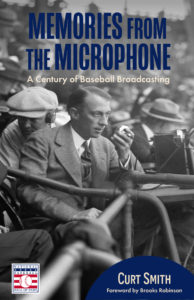Memories from the Microphone: A Century of Baseball Broadcasting
 Memories from the Microphone: A Century of Baseball Broadcasting is the first book to commemorate the first 100 years of the pastime on the air. Its tale began August 5, 1921, when part-time announcer Harold Arlin did play-by-play of baseball’s first game on the “wireless”—Pirates 8, Phillies 5—over America’s first commercially licensed radio station, KDKA Pittsburgh. (Mango Publishing, 2021, 302 pages.)
Memories from the Microphone: A Century of Baseball Broadcasting is the first book to commemorate the first 100 years of the pastime on the air. Its tale began August 5, 1921, when part-time announcer Harold Arlin did play-by-play of baseball’s first game on the “wireless”—Pirates 8, Phillies 5—over America’s first commercially licensed radio station, KDKA Pittsburgh. (Mango Publishing, 2021, 302 pages.)
Arlin, 26, a Westinghouse Company employee, sat in a box seat at Forbes Field in Pittsburgh, put a scorecard on a plank, and used a telephone as a microphone. What did he sound like that Friday afternoon? Hardly anyone is alive to say. “Sometimes the transmitter wouldn’t work,” Harold told Curt Smith in 1984, two years before Arlin’s death. “Often the crowd noise drowned us out. We didn’t know whether we’d talk into a vacuum,” or even describe another game.
Arlin would, foretelling a myriad of radio and later television Voices airing big-league baseball from the birth of sound ferried through the air to the pastime carried around the globe. In time, if they truly convey the game, such announcers become extended members of the family, filling a funhouse of look, sound, and feel. Memories from the Microphone tells how their play-by-play and analysis from nearby or distant places can forge almost existential pleasure.
Here are Voices known in every precinct—Mel Allen, Red Barber, Harry Caray, Vin Scully. Here are fellow recipients of the Hall of Fame’s annual Ford C. Frick Award for “broadcast excellence”—among them, Jack(s) Brickhouse and Buck, Marty Brennaman, Jerry Coleman, Bob(s) Costas and Elson, Dick Enberg, Joe Garagiola, Curt Gowdy, Ken Harrelson, Ernie Harwell, Russ Hodges, Jaime Jarrin, Tim McCarver, Denny Matthews, Al Michaels, Joe Morgan, Lindsey Nelson, Bob Prince, Byrum Saam, Chuck Thompson, and Bob(s) Uecker and Wolff—and more.
Here are other linguists from Dizzy Dean, Hank Greenwald, Milo Hamilton, Pat Hughes, Ernie Johnson, and Ned Martin to Eric Nadel, Phil Rizzuto, Charley Steiner, Dave Van Horne, Suzyn Waldman, and Jim Woods—some buoying local-team coverage; others, network, like Graham McNamee, the first national Voice on NBC’s 1923-34 World Series. Previously, baseball had meant books, periodicals, and above all, daily papers. “Sports’d been in print,” said McNamee. “Now, increasingly, they meant a box”—radio’s, then TV’s.
In Memories, Al Helfer and Gordon McLendon key radio’s first national series on 1950s Mutual and Liberty, respectively—and Dean forges TV’s first network sports series, the landmark mid-century CBS Game of the Week. Allen and Barber become baseball’s Laurence Olivier and John Gielgud. Gowdy was NBC’s 1966-75 network TV Voice. Scully sublimely did the 1983-89 Game, All-Star Game, and postseason. Since then, Fox’s Joe Buck and Fricksters Jon Miller and Costas, among others, have split the pastime’s national balls and strikes.
Orchestrated chronologically, Memories from the Microphone weaves these and countless others into the history of the game and the wider culture, unfolding era by era. Enjoy their tales—and the evolution from radio re-creation via television’s center-field camera shot, videotape, the SuperStation, and other cable to the technology of the Internet age—a lifetime of America’s oldest and greatest game. Theirs is the story of how radio and TV have helped baseball matter.
